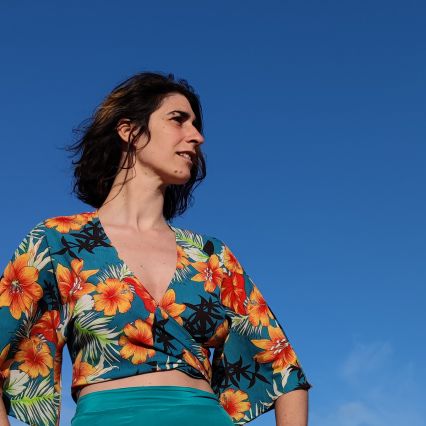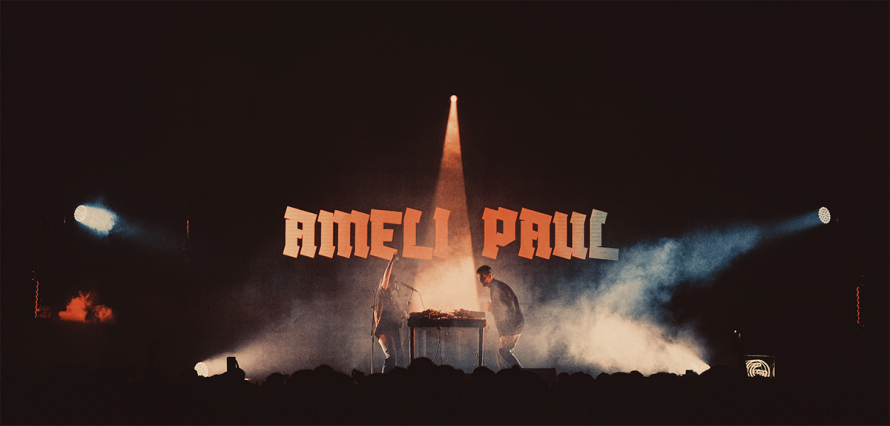Techno auf der Opernbühne - Deutsche Oper Berlin
Techno on the opera stage
The festival “Playground” will present electronic music that combines organic elements like vocals, animal skin, and strings. On the stage: the audience itself. Not to mention the trio Brandt Brauer Frick!
When you dance to techno and related genres, you usually aren’t thinking about your tax filings or shopping list. Dance music is less about lists and responsibilities than about letting your hair down, or the controlled disorientation that pushes us out of our daily routines like a gentle but firm centrifugal force. I confess that I’ve thought about my taxes while at the theatre, but I was sitting still. For this second rendition of the “Playground”, the audience itself will be up on the stage – indeed, the largest stage at the Deutsche Oper Berlin.
“Our dance floor this year is the Große Bühne,” says curator Carolin Müller-Dohle, “so anyone entering the room for the first time is always astonished.” The scope itself is dizzying: Even when the sound doors on the sides are closed, the stage is 21 metres deep, 27 metres wide, and 32 metres tall. Your vertigo is amplified if you lean your head back to look up. Or you get a sense of the oceanic vastness that we only rarely get to experience in our modern, spoiled age of compact living spaces. The stage holds up to 800 people, and even then it doesn’t feel too cramped. “We’re really excited to open up this space to the public,” says Müller-Dohle.
The iron curtain – a mandatory fire safety installation for theatres – will also separate the seating area from the stage, where three groups will appear: first the Berlin duo Ameli Paul, then headliners Brandt Brauer Frick, followed by a set by French DJ Océane. The only thing separating the performers from the standing audience will be a small podium. Can we get some more information about that last part?
“For one, the audience will mostly consist of young people who are interested in the artists and the unusual location,” says the curator. “Secondly, there will also be a somewhat older opera audience who wants to get on the dance floor again. Last year, a relieved mother wrote to me saying that she was finally able to take her 15-year-old daughter to the opera!”
The spatial disorientation combined with music will also create a conceptual plane. Whether you call the music electronic, electro-acoustic, or a mix of genres, it will be a frenzy of different concepts. Voices, animal skin drums, hands, and strings will be heard through the music.
Acoustic and electronic music are as intertwined today as dancing and tango, avoiding eye contact and permeating the body. Singer Franziska Ameli Schuster from the duo Ameli Paul has an education in classical music and jazz, but she enjoys flipping the script: techno aspects in classical spaces and astonishing club crowds with an aria, for example. And the DJ (not “female DJ”, a term that will not be appreciated) Océane, whose very name conveys the sense of the vastness of the space, will close out the evening with a set containing deep abysses, high vocal tones, and snippets of guitar.

At the heart of the set is Brandt Brauer Frick (BBF), a band that helped create the genre of DIY techno in 2008. The name of their album released over the summer – “Multi Faith Prayer Room” – seems prescient given the physical characteristics of the “Playground”. “A club is kind of like the multi-faith prayer rooms at airports,” says Berlin-based composer Paul Frick, who plays the keyboards, synth, and percussion for BBF, over the phone. “At both places, people who otherwise have nothing in common come together.” And that's exactly what this evening seeks to achieve with musical - and thus transcendent - means.
When BBF started mixing acoustic and electronic instruments and performing dance music, many perceived it as strange. “Even though others started exploring this area in the late aughts as well, electronic music wasn't as big then as it is now,” says Frick. “Our music doesn't sound more familiar now because listeners know about the concept, but rather because techno has become more widespread.”
Vocals – a central tool in opera – plays a different role on this album than it did previously. Snippets of sentences from 500 interviews with questions about the future, faith, and rituals play out over three short montages, also known as skits. Guest artists sing on over half of the tracks. “When we treat vocals like material and edit them electronically,” says Paul Frick, “you’ll be able to hear that at the Deutsche Oper Berlin. But we don’t want an entire vocal line to sound like it’s being played by a live band.” This would be in contrast to techno and opera in equal measure.
With every overlap between classical and electronic music, such as when it comes to the longing for emotional transcendence, the human body is at the heart of “Playground”. After all, music is supposed to move us – literally.

Tobi Müller is a freelance culture journalist and author. He writes and speaks about the performing arts, pop, and digital topics.





